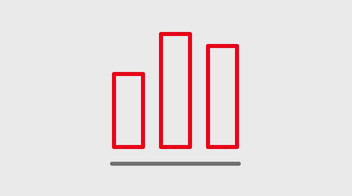Print page
Sustainability management
The topic of sustainability, with its aspects in the environmental, social and governance dimensions, is of great importance to DB Group. The focus on climate protection, but also on social issues such as employee satisfaction and the proportion of women in leadership, is also reflected in its anchoring in the Strong Rail strategy. The Chief Sustainability Officer (CSO) is responsible for the issues of sustainability and the environment – and therefore also for climate-related opportunities and risks. The role is exercised by the CEO of DB AG. The CSO’s perspective is therefore incorporated in a very central role in all important Group decisions. In his dual role, the CEO was also significantly involved in the development of the Strong Rail strategy with regard to climate-relevant decisions. The CEO is also responsible for compliance issues. Responsibility for employee issues lies with the Member of the Management Board for Human Resources and Legal Affairs, and for occupational safety issues with the Member of the Management Board for Digitalization and Technology. In 2023, the Management Board decided, for example, to back up the climate protection target with greenhouse gas reduction paths.
The central Sustainability and Environment organizational unit is responsible for overall coordination of Group-wide sustainability issues. The Head of Sustainability and Environment is the highest function responsible for sustainability-related issues under the Management Board and reports directly to the CEO. The respective specialist departments are responsible for the content of sustainability issues. The main objective is to drive the green transformation and social responsibility of DB Group and to gradually make all products, services and operating processes more sustainable. Specific tasks include the definition of the integrated sustainability strategy, the associated Group-wide targets and key figures, their planning and monitoring, and the planning, management and implementation of Group-wide transformation projects. This will be used to make recommendations for action or guidelines for DB Group, including business units and service units. They are responsible for implementing the objectives, strategies and measures.
The respective Management Board divisions and business units are responsible for sustainability issues.
Group management focuses further its compliance work on centralized governance activities in particular. Operational responsibility is exercised in the business and service units.
Employee matters are supported by the HR Group functions within the Group management. Group-wide implementation is carried out in coordination with the business units. Aspects of occupational health and safety are not centrally set up, but are integrated into the business activities and taken into account within the management systems of DB companies.
We employ various environmental monitoring tools, which we use to continuously analyze developments in the area of sustainability, in particular current environmental legislation procedures. Our sustainability radar is a core process in the definition of strategy. We also publish a regular newsletter that summarizes current technical and regulatory developments. The use of environmental monitoring tools, participation in ESG ratings and rankings and our cooperation in national and international (sustainability) networks ensure that trends and drivers as well as opportunities and risks in the areas of sustainability and the environment, including climate protection and climate resilience management, are monitored for DB Group, and are strategically and expertly evaluated. This ensures Group-wide access to expertise on sustainability and environmental and climate issues.
Sustainability and the environment are high priorities of the Strong Rail strategy. The Supervisory Board is informed in the quarterly Supervisory Board management report on the current status of the sustainability performance. The Management Board is informed monthly. Progress in greenhouse gas reduction, noise reduction and resource conservation is reviewed at regular performance review meetings held during the business year, which are attended by Management Board members and the management bodies of the business units. The CEO is informed about sustainability-related topics through regular briefings and monthly meetings with the Head of the Sustainability and Environment division.
During the business year, the Chief Compliance Officer (CCO) informs the Management Board about the expansion of the compliance program and significant compliance cases along with compliance risks. In addition, the Management Board receives a compact annual compliance report. The report describes the risk exposure of business units, service units and Group management functions in detail, and highlights existing risk-reducing factors and countermeasures. The CCO also reports on compliance issues, including Group-related and critical issues, at least once a quarter in the Audit and Compliance Committee formed by the Supervisory Board.
Sustainability in remuneration

The structure of the variable remuneration of Management Board members, executives and other employee groups in DB Group is very much geared toward sustainability targets, with the objective of a sustainable traffic transition and the resulting noticeable CO₂e reduction of DB Group and in the transport sector in Germany in line with the Federal Government’s transport policy objectives:
- The long-term variable remuneration (long-term incentive; LTI) of Management Board members and executives with an LTI commitment includes, as crucial factors, a target for the expansion of the proportion of renewable energies in the traction current mix (from 2024 to reduce absolute greenhouse gas emissions in the Integrated Rail System) and volume targets for a sustainable shift in the mode of transport to rail. Achieving these targets is the key lever both for reducing DB Group’s CO₂e emissions and for reducing CO₂e emissions in the transport sector in Germany overall.

- In addition, the short-term variable remuneration (short-term incentive; STI) of Management Board members, executives and other employee groups includes as crucial components, aligned with the strategic Strong Rail targets, key figures for a sustainable shift in the mode of transport (customer satisfaction and punctuality) and for employee satisfaction and the expansion of the proportion of women in leadership. In addition, personal performance, or for the variable remuneration (annual variable payment) of employees covered by collective bargaining agreements, the reduction of the CO₂e emissions of the railway in Germany, is also taken into account as a further component.
Details on the remuneration of the Management Board and Supervisory Board are set out in the remuneration report.
Social responsibility
With more than 292,000 employees (excluding DB Arriva) worldwide, about 1.8 billion passengers per year and numerous partners, DB Group is a central part of society. In addition to environmental and economic aspects, commitment to social issues is also an integral component of our holistic approach to sustainability.
Our social responsibility is expressed in four standpoints that guide our day-to-day actions and serve as a basis for a wide range of activities at all levels of DB Group:
- Strengthening community: As one of the largest groups in Germany, we have a responsibility toward a large number of people. We strive to be consistently fair and responsible toward our fellow human beings. As an employer, we attach particular importance to good working conditions, lifelong learning and effective health management. Ensuring the safety and integrity of our employees and customers is also an important focus. Other important topics where we are committed to responsible, fair cooperation with third parties include: compliance, data protection and sustainable supply chains.
- Supporting social engagement: As an important participant in society, we are committed to the community beyond our business operations. The independent Deutsche Bahn Foundation is of central importance here. In addition, DB Group is also committed to a wide range of social causes, for example in the form of emergency humanitarian aid in crisis situations.
- Promoting diversity: The appreciation of social diversity is a central component of our corporate culture. Equal opportunities and inclusion are therefore our aim as well as being essential pillars of our HR policy. The appreciation of social diversity applies to us, however, not only in the workplace, but also in view of our customers. Our commitment to accessibility in trains and stations underlines this basic standpoint.
- Responsibility for our history: As DB Group, we are inseparable from the nearly 200-year history of the railway in Germany. This includes a rich cultural legacy, but also the history of the Deutsche Reichsbahn under the Nazis.
Further information on social responsibility can be found on our Web site.
ESG ratings
The feedback from ESG (environmental, social, governance) rating agencies is an important benchmark and indicator of the interests of our stakeholders. More information is available on our investor relations Web site.
ESG ratings | 2023 | 2022 | 2021 | Last update | Scale |
CDP (climate rating) | A– | A | A | Feb 2024 1) | A to F |
EcoVadis | 68 | 68 | 61 | Jun 2023 | The best 1% (75 –100) The best 5% (67 –74) The best 25% (56 –66) The best 50% (47 –55) |
ISS ESG | B– | C+ | B– | Sep 2023 | A+/4.00 to D –/1.00 |
MSCI | A | AA | A | Dec 2023 | Leader (AA – AAA) Average (BB – A) Laggard (CCC – B) |
Sustainalytics | 22.1 | 24.5 | 19.7 | Aug 2023 | Risk assessment: Negligible (0 –10) Low (10 –20) Medium (20 –30) High (30 – 40) Severe (40 – 100) |
In alphabetical order.
1) CDP published the 2023 climate rating results in February 2024.
Changes in 2023:
- CDP: The CDP rating of DB Group was downgraded in 2023. The drivers for the change from 2022 include increased requirements (in the leadership band) and a change in scoring methods. This result places us in the highest category “leadership” and among the best 6% in the climate change questionnaire.
- EcoVadis: With its overall score for 2023, DB Group is one of the top 2% of companies rated by EcoVadis in the “Transport via railways industry” category, and has maintained its score from the previous year. The industry average is 42 points. DB Group was also awarded a silver medal (2022: gold medal) for its sustainability performance. This change from the previous year is due to an adjustment of the medal scale by EcoVadis.
- ISS ESG: In the ESG Corporate Rating by ISS ESG, DB Group’s score was upgraded in 2023. This is due, among other factors, to better assessments in the area of “governance” and a positive trend in the area of “eco-efficiency.” This means that DB Group was ranked in the 1st decile, and was once again awarded Prime status.
- MSCI ESG: DB Group’s MSCI ESG rating∞ was downgraded in 2023. This was driven by the removal of the previous key issue of “community relations,” with the associated change in the weighting of topics and the relative improvement of the peer group.
- Sustainalytics: Sustainalytics adjusted DB Group’s ESG risk in 2023. This is due to a better assessment of the management of individual ESG issues.


